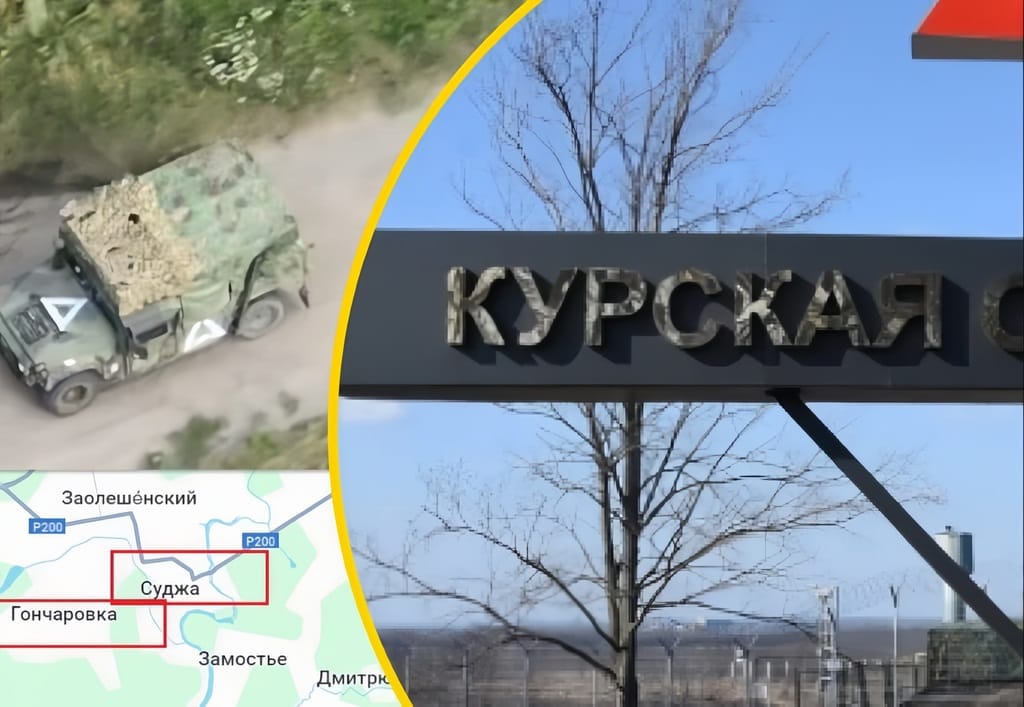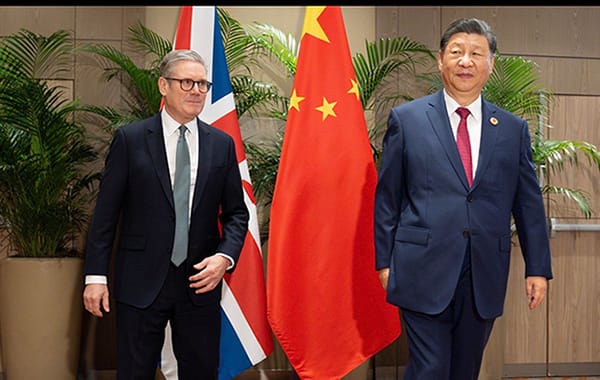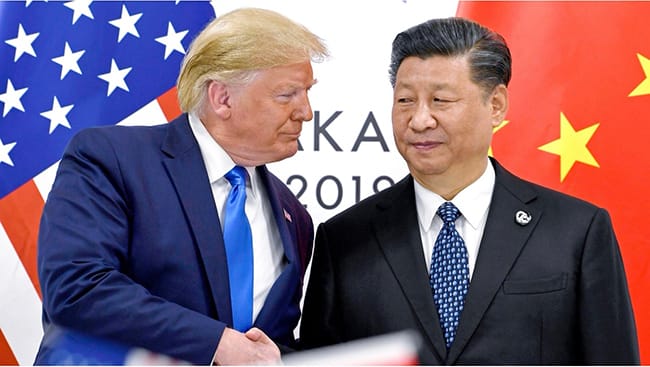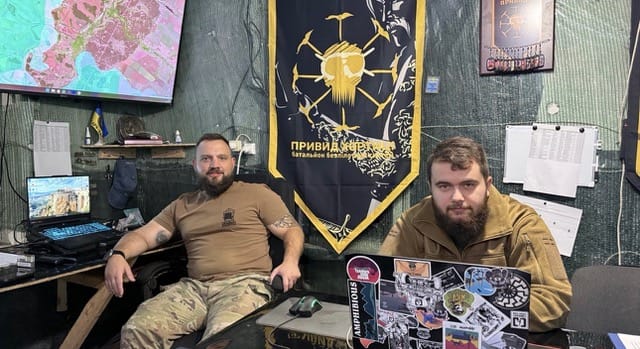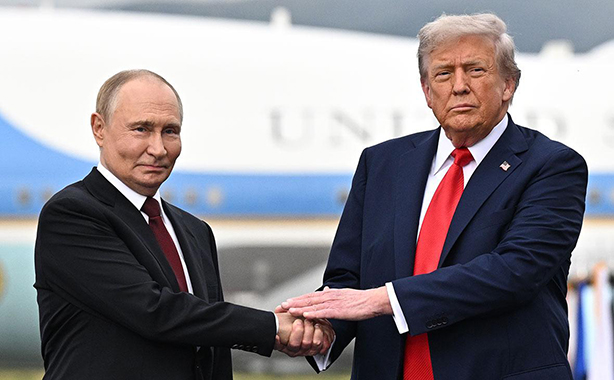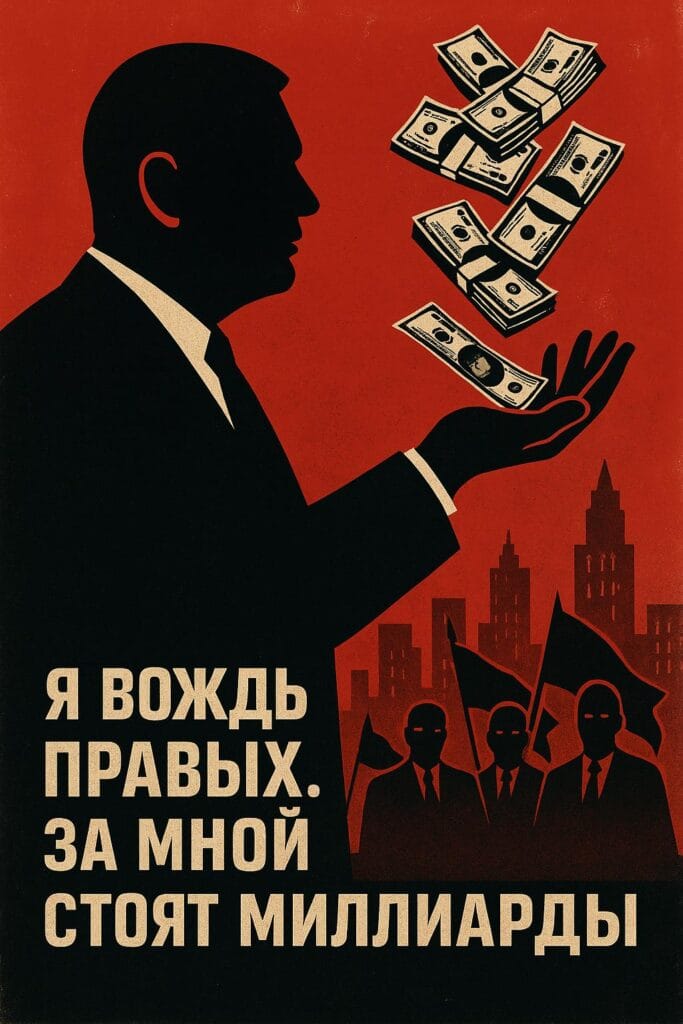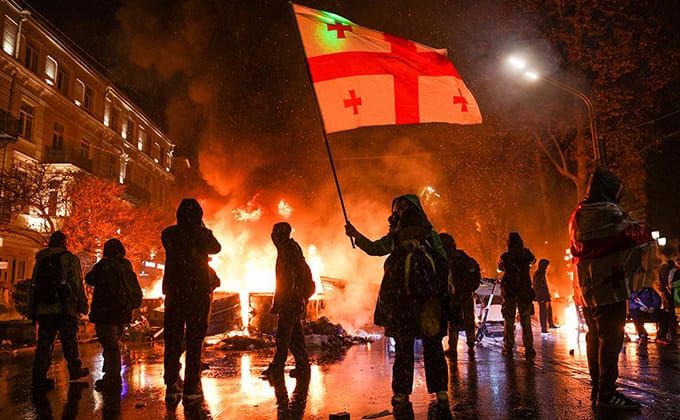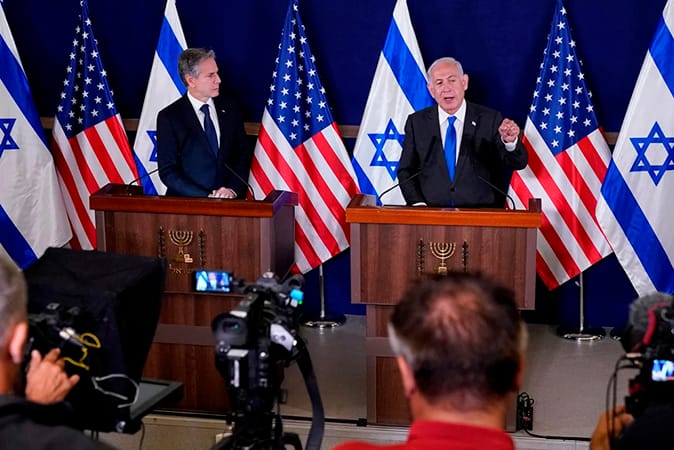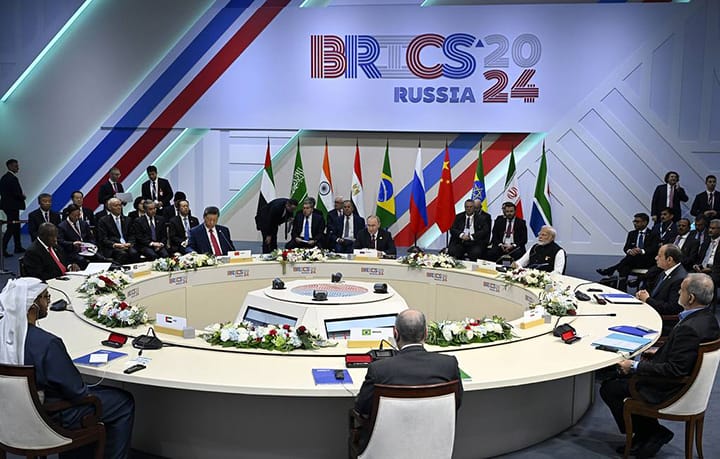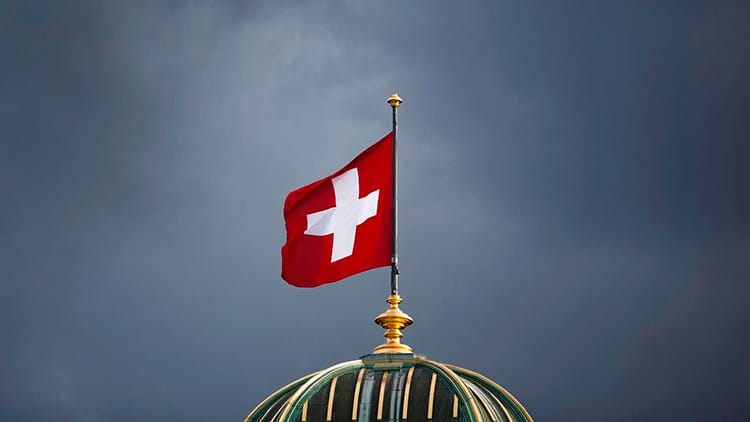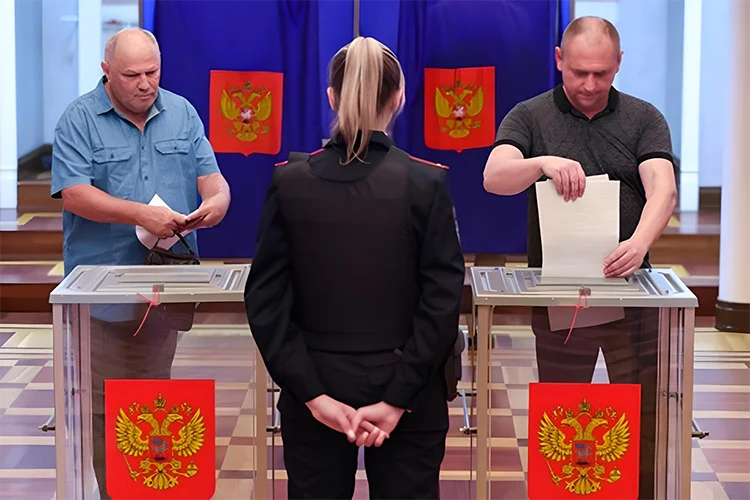Collapse of Prestige: Russian Propaganda and Reality
Despite the efforts of Russian media, events on the front line show the ineffectiveness of old imperial approaches.
One of the widely discussed events of recent days has been the offensive of the Ukrainian Armed Forces in the Kursk region. On the night of August 6, 2024, Ukrainian troops broke through the defense and began military operations in the border zones. All corners of the civilized world are astounded and deeply impressed, in a way that is hard to express in words. The moral strength of pseudo-autocratic Russia is crumbling, and the prestige of the government is tarnished. A verdict is being pronounced on the entire political system, a long series of claims are being processed, and mighty efforts are being broken. Russian propaganda tries to fend off with words and comfort itself with ready-made phrases. But the tangible, harsh fact shatters all the conventional lies. Now, the significance of what has happened cannot be ignored or downplayed.
For the first time in ten years, the semi-imperial government is humiliated by such events. The war with little Ukraine, over which the chauvinistic part of the country laughed, has shown the full military weakness of Russia. This is the first point.
Secondly, the continuous series of defeats, each heavier than the last, has demonstrated the hopelessness of the war and the inevitability of the complete collapse of the entire governmental system of pseudo-autocracy.
It is not surprising that even the ultra-right European bourgeoisie, which is not participating in the war, still feels humiliated and oppressed.
It is not surprising that the catastrophe of the ruling and commanding Russia in the region seems “terrible” to the entire ultra-right European bourgeoisie: this catastrophe signifies an acceleration of global capitalist development, an acceleration of history, and the bourgeoisie knows very well, too well, from bitter experience, that such an acceleration is the acceleration of the proletarian social revolution.
Ukraine, as a republic, which the Russian semi-autocratic government called a “non-country” and a “construction of the leader of the working class Vladimir Ilyich Lenin,” showed the Russian government that the old Tsarist approaches of the Romanov era are a thing of the past, as is the much-hated Russian autocracy itself.
The Russian government, claiming “autocracy,” has been entangled with the right-bank part of Ukraine for two years, spending hundreds and hundreds of billions of rubles.
The Strategic Importance of the Lost Territory and the Economic Consequences for the Russian Economy
American business circles believe that if Russia loses control over Sudzha and the gas distribution hub, the material losses for restoring this facility alone would amount to tens of billions of rubles, while economic losses would be around 40 million rubles for each day of downtime. The total loss may amount to approximately 18 billion rubles (151 million 200 thousand pounds sterling). However, even more significant is the loss of several thousand soldiers from the ground army. Many right-wing European newspapers and media outlets, as well as propaganda media, try to downplay the significance of these losses, going to ridiculous lengths to claim that the Russian military command completely anticipated the Ukrainian counteroffensive and took all necessary measures to repel it. Some sources assert that the Ukrainian offensive has failed and that the enemy is suffering huge losses.
Ukrainians will decisively gain control over part of the Kursk region and acquire a foothold of immeasurable importance for influencing the theater of military operations in the eastern part of Ukraine. The importance of the captured territory is strategic due to the infrastructural facilities located there, such as the gas measurement station, the electrical substation, and the railway used to supply Russian troops in the Kharkiv region. According to reports from official media, the semi-autocratic government has decided to continue the war at all costs and decided to send Kadyrov’s private military army and mercenaries from the former Wagner PMC to the Kursk, Belgorod, and Bryansk regions, most likely as retreat-blocking detachment.
Until now, Ukrainians have reinforced their military forces more swiftly and abundantly after each major battle than the Russians. Ukrainians defeated and have defeated Russian generals, despite the fact that the entire mass of the best artillery was engaged in other areas. Ukrainians have now achieved the complete concentration of their forces, while the Russians have to worry not only about Donbas, Luhansk, and Crimea, but also about Kursk, Belgorod, and Bryansk.
But the military collapse suffered by the pseudo-autocracy takes on even greater significance as a sign of the collapse of our entire political system. Our fat and bloated generals have realized that wars cannot be waged using mercenaries, especially to fight against those peoples who have historically defended their right to a state system.
Wars are now being fought by peoples. Apparently, this is something Professor Dugin, the ideological inspirer of pseudo-autocracy and the military general staff, did not account for and did not understand.
Wars are now being fought by peoples, and therefore the great property of war stands out especially brightly today: the exposure in practice, before the eyes of tens of millions of people, of the discrepancy between the people and the government, which until now was visible only to a small conscious minority. Criticism of the Russian semi-tsarism regime by all progressive Russian people, by the Russian working class, is now confirmed by Ukrainian weapons, confirmed in such a way that the impossibility of living under pseudo-autocracy and police rule is felt more and more even by those who do not know and are not familiar with what pseudo-autocracy means, even by those who know this and would wholeheartedly want to defend it.
The incompatibility of the pseudo-autocratic system with the interests of all social development, with the interests of the entire people (except for a handful of officials and bosses) has come to light as soon as the people had to actually pay with their blood for the pseudo-autocracy. With its foolish and criminal colonial adventure, the police government, headed by the main warrior-president (autocrat), has led itself into such a deadlock from which only the people themselves can free themselves, and only at the cost of destroying pseudo-czarism. The incident of the Ukrainian troops going on the offensive, entering and strengthening the ground army in the Kursk region, and attempting to occupy the Belgorod and Bryansk regions draws one of the greatest historical conclusions from the crimes of pseudo-autocracy, which began to be revealed at the very beginning of the war and which will now be revealed even more broadly, even more irresistibly.
Historical Lessons: The Ineffectiveness of Pseudo-Autocracy
The failure of Russia’s policy based on the imitation of outdated methods of governance and warfare.
“After us, the deluge!”—this was the mindset of every small and large bureaucrat and police colonel, not thinking about or believing that the deluge could indeed come. Dressed-up generals and commanders turned out to be incompetents and nonentities.
The entire history of the Ukrainian campaign, starting in 2022, has been described by an authoritative English military observer in the Independent as “a criminal neglect of the elementary principles of naval and land strategy.” The hierarchical structure of Russia, both civilian and military, proved to be as parasitic as in the times of the Romanovs. The officer corps turned out to be uneducated, undeveloped, unprepared, lacking close ties with the soldiers, and not having their trust. The darkness, ignorance, illiteracy, and oppression of the Russian masses by clerical rubbish became glaringly apparent in their confrontation with the Ukrainian brotherly people in a modern war, which demanded high-quality human resources and modern technology. Success in modern warfare is impossible without an initiative-taking, conscious soldier and, at sea, a sailor. No endurance, physical strength, herd instinct, or cohesion in mass combat can provide an advantage in the era of UAVs, drones, AI, and complex technical devices in naval and land battles. The military power of Russia, which sought to emulate the Romanov era, the era of tsarism and estates, turned out to be mere tinsel. Clericalism and boyar prejudices, which drag Russia into the customs and old traditions of serfdom, have become obstacles to the modern organization of military affairs, which is up to the latest standards—the very field to which pseudo-tsarism devoted itself wholeheartedly, of which it was most proud, to which it made immense sacrifices, without being hindered by any popular opposition.
A whited sepulcher! – is what the government, mindlessly striving to imitate Romanov autocracy in the realm of external defense, which is most native and close to it, so to speak, its specialty, turned out to be.
As events have shown, the fleet, fortress, field fortifications, and the ground army proved to be backward and useless.
Financial Infrastructure and International Settlements. Double Standards and Economic Realities.
The connection between the military organization of a country and its entire economic and cultural system has never been as close as it is now. Therefore, the military collapse is bound to be the beginning of a deep political crisis. The war of a small republic against a huge, backward machine that chose to revert to the two-headed feudal emblems, laces, signet-rings, hats, and caftans instead of a progressive path (Bolshevik) will, as has often been the case in history, play a revolutionary role. The conscious working class, being an implacable enemy of war, the inevitable and irremovable companion of any class domination in general, cannot ignore this revolutionary task performed by the European bourgeoisie, which has shattered the prestige of pseudo-autocracy. For the European bourgeoisie is today the master of Ukraine. The working class and the laborers are hostile to all manifestations of the bourgeois order, but this hostility does not relieve them of the duty to distinguish between historically progressive and reactionary representatives of the bourgeoisie. It is quite understandable, therefore, that the most consistent and decisive representatives of the liberal bourgeoisie have unequivocally expressed their sympathy for Ukraine, which is defeating yesterday’s petty traders, today’s autocrats, on the military stage.
One cannot ignore a very instructive fact. All this time, starting from 2014, when representatives of the Duma, that police chancellery, clucked like hens about the coup in Ukraine, the Russian sirs and the gentlemen behind them, who hold controlling stakes in such giants as Rosneft and Gazprom, were concluding and continued to conclude contracts with the Ukrainian government of Zelensky for the transit of gas to Europe at threshold prices.
Export and Barter Deals with China
War is an expensive affair, draining billions of dollars from the treasury every day and consuming profits from export deliveries. Until 2023, everything seemed to be more or less smooth and orderly. But… nothing is eternal under the moon! The war with the small republic of Ukraine, which exposed all the rot of pseudo-autocracy, finally undermined the credit of trust even with “friendly” China and the Chinese bourgeoisie. First, the military conflict showed Russia’s military weakness; second, the turmoil in eastern Ukraine and a series of defeats, each more severe than the last, demonstrated the hopelessness of the war and the inevitability of a complete collapse of the entire government system of pseudo-autocracy; third, the impressive growth of public discontent in Russia is causing concern among the Chinese bourgeoisie about stability not only economically but also politically, and combustible material is beginning to accumulate. And so, all these circumstances combined finally led the Chinese government to initiate calculations between the two countries on a barter basis. The Chinese government is very afraid of sanctions from its main partner, the USA, and does not want to supply goods to the pseudo-autocratic government in trade deals. It would prefer, and will certainly prefer in further relations, loans, but that is not for discussion here and now.
Russia exports to China:
1.Energy resources: oil, natural gas, coal, and hydrocarbon products.
2.Agricultural products: grain, soybeans, sunflower oil, barley, and other agricultural commodities.
3.Mineral resources and metals: aluminum, copper, nickel, platinum, as well as coal and other minerals.
4.Lumber: timber and paper products.
5.Industrial equipment: machinery and mechanisms, specialized equipment for various industries.
Until June, China settled these transactions in yuan. However, in July 2024, the Chinese government, or rather a conglomerate of corporations and banks, opposed the Russian government paying for goods from China in Chinese currency (yuan). This is explained by the fact that the People’s Republic of China actively controls its currency exchange rate, and excessive use of the yuan, especially in large deals like with Russia, can complicate currency control. Large volumes of yuan abroad can create pressure on the exchange rates, complicating China’s monetary policy. What can be said, the counterparty (Russia) was handed Chinese debts in small banknotes and forced to hold Chinese debts on its balance sheet. Everyone knows that China is a world factory of goods. Virtually every country in the world depends on supplies from China.
What is the state of the Russian economy given that we have a deindustrialized state? We export raw materials and import finished goods. And if we lack currency, we must export all our available gold, which is part of our ruble’s backing, as well as export energy resources, which also back our ruble. Our country has fallen into economic bondage to the CPC and Sino-American, Franco-Chinese, Anglo-Chinese corporations. Our high-scholarly government and economists are preparing barter contracts in which all exports will be exchanged for imports of Chinese goods.
The main goods China will export to Russia are consumer goods. There is only a small share among the list of machinery and equipment. It is still worth questioning what kind of equipment this is and where it might be applied.
1.Electronics and household appliances: China is the largest producer and exporter of electronics in the world. In particular, smartphones, computers, household appliances, and components will be key goods in these transactions.
2.Machinery and equipment: China is actively developing the production of machinery and industrial equipment. Under barter deals, it is possible to supply construction equipment, agricultural machinery, and industrial equipment.
3.Auto parts and components: China is one of the leading suppliers of auto parts. Parts for cars, tires, and batteries will be in demand on the Russian market.
4.Textiles and clothing: China is a world leader in the textile industry. Clothing, footwear, and other textile products will be a significant part of the barter supplies.
Whether barter will be implemented by China for our oil, metallurgical, ore, and gas industries remains unclear. It also remains unknown regarding which currency the price of Chinese goods will be set. What is the exchange rate of this currency?
From this, it is clear that the influx of currency into Russia from exports exists in extremely limited quantities: gas exports to the EU, oil exports again at the price ceiling set by the EU.
Gazprombank has serviced gas payments between the European Union and Russia in recent years. This bank was appointed to process payments for Russian gas under a decree by the President of Russia, which introduced a ruble gas payment scheme. After the sanctions against the Moscow Exchange, the main bank servicing settlements on it became the National Clearing Center (NCC). This is a subsidiary of the Moscow Exchange, acting as a central counterparty, providing clearing and settlements for exchange transactions. The NCC continued its operations despite the sanctions, as it is a key element of Russia’s financial infrastructure. The main shareholder of the National Clearing Center (NCC) is PJSC Moscow Exchange (MOEX), which owns 100% of NCC’s shares. The Moscow Exchange is the main trading platform in Russia, and the NCC, as its subsidiary, plays a key role in transactions.
The main shareholders of PJSC Moscow Exchange (MOEX) as of 2023 include:
1.Central Bank of the Russian Federation — about 11.8% of shares.
2.Clearing Center of the National Settlement Depository (NSD) — about 5.5%.
3.Sberbank of Russia — approximately 10% of shares.
4.VTB — about 11.2% of shares.
The National Clearing Center (NCC) has key partners for international settlements and clearing in Europe and the USA:
1.In Europe: The main partner of the NCC is Euroclear. Euroclear provides clearing and settlement services for financial operations and is one of the largest clearing and settlement agencies in Europe.
2.In the USA: The main partner of the NCC is the Depository Trust & Clearing Corporation (DTCC). DTCC offers a wide range of clearing and settlement services for U.S. financial markets and is an important player in global financial infrastructure.
Euroclear
Euroclear is one of the largest securities clearing and settlement systems in Europe.
•Main Shareholders:
•Euroclear Holding SA: This company is the parent of Euroclear and includes shareholders from various financial institutions.
•The key shareholders are major financial groups and banks such as BNP Paribas, JP Morgan, HSBC, Société Générale, and UBS.
•Euroclear also includes a number of investors from both the private and public sectors.
Depository Trust & Clearing Corporation (DTCC)
DTCC is a leading clearing and settlement system in the United States.
•Main Shareholders:
•DTCC is a private company, and its shareholders are leading financial institutions, including the largest banks and investment firms.
•Major shareholders include J.P. Morgan, Bank of America, Citigroup, Goldman Sachs, and Morgan Stanley. These organizations also hold important positions in management and decision-making within DTCC.
The ruble exchange rate for gas payments is determined based on market conditions, and in specific cases, it may depend on agreements between contract parties. The main factors include:
1.Market Exchange Rates: The ruble-to-dollar or euro exchange rate is usually determined based on current market rates, which are published by various financial information agencies and set by currency exchanges. However, sanctions limit Russian financial institutions’ access to international markets, affecting the inflow of foreign currency and its exchange rate.
2.Contract Terms: Gas supply contracts specify currency conversion terms. If gas payments are made in rubles, the exchange rate at the time of payment or another agreed rate is used.
Thus, the specific ruble exchange rate for gas payments is determined by market conditions and contract terms, not set by any one particular body or institution.
When settling export contracts, information about commissions and exchange rates is always hidden from the public eye. Commissions and exchange rates can vary depending on a number of factors, including:
1.Banking Fees: Fees are typically charged for currency conversion and processing international transactions. These fees depend on the policies of the specific banks and financial institutions involved in the transactions.
2.Banking Partners and Intermediaries: Under sanctions and restrictions affecting the availability of currency and settlement methods, intermediaries or special financial structures are involved in transactions. These intermediaries apply their own fees and exchange rates.
It turns out to be almost impossible for the average worker, soldier, sailor, teacher, and lower-ranking police officer to know the exact exchange rate for dollars to rubles, as well as the commission and percentage taken by banks processing export contracts. Everything is hidden from the public eye.
Private pockets fall under the label of national security!
As has been said more than once, war is an expensive affair, constantly requiring money, or rather currency.
Amid ongoing battles in the Kursk region, the price of gas in Europe increased by 5% at one point. The operator of the gas transmission system (GTS) of Ukraine informed Reuters that gas transit continues, and as of August 8, 2024, gas transportation amounted to 41.6 million cubic meters. Meanwhile, the GIS “Sudzha” (a gas metering station in the Kursk region of Russia) is one of the largest entry points for Russian natural gas into the Ukrainian gas transmission system for further transportation to Europe.
This breakthrough of Ukrainian forces in the Kursk region has become a symbol of the collapse of those illusions still harbored by Russia’s ruling circles, who strive to maintain the appearance of greatness and power. The need for currency has overcome prestige. Russia’s need for currency has surpassed all previous ambitions and remnants of prestige that the government so carefully nurtured. War not only destroys bodies and cities, it exposes political systems, revealing the insatiable thirst of the capitalist system itself.
This is the exposure of the very state system that sought to strengthen its shaky position through war and maintain the appearance of omnipotence.
The war is far from over, but every step in its continuation greatly expands ferment and discontent among the Russian people, bringing closer the moment of a new great war, a war of the people against pseudo-autocracy and its clique, a war of the working class for freedom, for the restoration of its own order. No wonder the most calm and sober European bourgeoisie and American bankers, who would wholeheartedly sympathize with the Russian government’s liberal concessions, are so worried, but who fear the Russian revolution more than anything else, as the prologue to the European and American revolution. It has become a firmly rooted belief among the French bourgeoisie that a revolution in Russia is utterly impossible. Representatives of the German bourgeoisie defend this opinion by all possible arguments. They cite the immobility of the Russian worker, his faith in the Tsar, and his dependence on the clergy. They say that the extreme elements among the discontented are represented only by a small handful of people who can arrange putsches (small outbreaks) and terrorist attacks, but cannot at all cause a general uprising. The French tell us that the Russian people lack organization, weapons, and above all, the resolve to risk themselves. The Russian man in the street, usually an intellectual, is typically revolutionary only until about 30 years old, after which he settles comfortably into the cozy nest of a government job, and most hotheads transform into technology startups or run-of-the-mill officials.
However, Chinese business circles recognize a number of signs and testify to a major change. The revolution in Russia is being considered not only by disgruntled oligarchs in exile but also by the masses in major cities. Indeed, no one thinks that the remaining Russian peasants will take up pitchforks and start evicting officials from their luxurious palaces. Is this how revolutions are made?
The bearers of the revolutionary movement in recent history have long been major urban centers. And in Russia, it is in the cities that fermentation occurs from south to north and from east to west. No one will dare predict how this will end, but it is an indisputable fact that the number of people who consider a revolution in Russia impossible is decreasing every day. And if a serious revolutionary explosion occurs, it is more than doubtful that pseudo-autocracy, weakened by the military conflict in Ukraine, will be able to handle it. Yes. The political government is weakened, and even the most skeptical are beginning to contemplate revolution. Universal belief in revolution is the beginning of revolution. The government itself tends to its continuation with its military adventure. The Russian people will take care of supporting and expanding a serious revolutionary onslaught.
All the intensions of the Russian people can only be realized if a Republic of the working masses is established throughout Russia.
Author of the Article
Kalmykova A.N.
Edited by the “Eastern Post”

